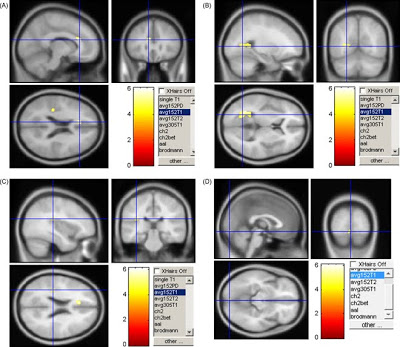Neuroscience

Internet addiction is a murky and controversial disorder that is the subject of intense debate over whether it should be included in the new DSM-V. Here are the proposed diagnostic criteria as developed by Dr. Kimberly Young:
Dr. Young was featured in a recent article, along with Dr. Vaughan Bell (of Mind Hacks fame) taking the contrary position:
On the other hand, internet addiction is accepted as a major a problem in several Asian countries, including China and South Korea. Some of you might be familiar with the stories of [alleged] abusive and illegal clinics in China. With this as background, it was inevitable that someone would do a neuroimaging study of individuals with IA, and it was a group in Shanghai that was the first to do so (Zhou et al., 2009).
In their study, 18 teenagers (2 females and 16 males, mean age = 17.23 ± 2.6) with IA were compared to 15 age-matched control participants. Structural MRIs were performed and quantified using voxel-based morphometry (VBM):
With all these caveats in mind, the results are shown below.

Fig. 1 (Zhou et al., 2009). Regions of decreased GM shown on the template in the left anterior cingulate cortex (A), left posterior cingulate cortex (B), left insula (C), and left lingual gyrus (D) in IA subjects compared with the controls.
Most of the changes look pretty small, so it's hard to know what to make of them. On top of that, some of the regions seem mislabeled (the posterior cingulate in particular looks way off). And the findings only demonstrate correlation, not causation.
So in the end we have no idea if "internet addiction" shrinks your brain...
Footnote
1 Blogging and social media are not addictive at all. Right?
Reference
Zhou, Y., Lin, F., Du, Y., Qin, L., Zhao, Z., Xu, J., & Lei, H. (2009). Gray matter abnormalities in Internet addiction: A voxel-based morphometry study. European Journal of Radiology DOI: 10.1016/j.ejrad.2009.10.025
 xkcd - Bored With the Internet
xkcd - Bored With the Internet
- What Kind Of Internet User Are You?
There used to be an advert on British television that showed people eating Cadbury's cream-eggs in a number of odd and inventive ways. The tag-line was 'How do you eat yours?' Now a pair of researchers based in Turkey, Leman Tosun and Timo...
- Online Gaming Addiction, Dysfunctional Families, And The Striatum
Internet addiction is perceived to be an important problem in some Asian countries, including Taiwan and Korea. Fatal marathon sessions of online gaming, in particular, have drawn a lot of media attention. Most recently, a teen in Taiwan died after playing...
- Chronic Disease And Using The Internet For Information
Last week, the Pew Internet & American Life Project released a report about individuals with chronic diseases and their use of the Internet to obtain and share information. The report is available at the link below: Pew Report on Chronic Disease and the...
- Internet Use Good For Brain Circuitry, As Well As For The Www
From The BBC: Internet use 'good for the brain' Read the full article [snip] Lead researcher Professor Gary Small said: "The study results are encouraging, that emerging computerized technologies may have physiological effects and potential benefits...
- Save Internet Radio
Lots of chatter on the online radio waves about dramatically increased royalty rates for webcasters, due to go into effect on July 15 (retroactive to Jan 1, 2006!) Of course, this would mean certain closure for many Internet radio web sites. The good...
Neuroscience
Does "Internet Addiction" Really Shrink Your Brain?

Internet addiction is a murky and controversial disorder that is the subject of intense debate over whether it should be included in the new DSM-V. Here are the proposed diagnostic criteria as developed by Dr. Kimberly Young:
You can rate your own level of addiction by taking the Internet Addiction Test (sponsored by The Center for Internet Addiction, of course).Answering "yes" to five or more questions may mean you suffer from Internet addiction over a six month period and when not better accounted for by a manic episode.
- Do you feel preoccupied with the Internet (think about previous online activity or anticipate next online session)?
- Do you feel the need to use the Internet with increasing amounts of time in order to achieve satisfaction?
- Have you repeatedly made unsuccessful efforts to control, cut back, or stop Internet use?
- Do you feel restless, moody, depressed, or irritable when attempting to cut down or stop Internet use?
- Do you stay on-line longer than originally intended?
- Have you jeopardized or risked the loss of significant relationship, job, educational or career opportunity because of the Internet?
- Have you lied to family members, therapist, or others to conceal the extent of involvement with the Internet?
- Do you use the Internet as a way of escaping from problems or of relieving a dysphoric mood (e.g., feelings of helplessness, guilt, anxiety, depression)?
Dr. Young was featured in a recent article, along with Dr. Vaughan Bell (of Mind Hacks fame) taking the contrary position:
Internet addiction: New-age diagnosis or symptom of age-old problem?. . .Kimberly Young, director of the online resource The Center for Internet Addiction, says that internet addiction may not yet be clearly defined, but you know it when you see it.. . .Young: “The internet has inherent value and utility, and there are many good things about it, but there is this dark side.”Or is there? Not according to Vaughan Bell, a visiting research fellow with the Department of Clinical Neuroscience, Institute of Psychiatry at King's College London in the United Kingdom. Bell has argued that the internet is not an activity, and therefore internet addiction is a flawed idea (J Ment Health 2007;16[4]:445-57).“Fundamentally, the internet is a medium of communication,” says Bell, who claims that one can no more be addicted to the internet than to radio waves. “The concept itself doesn’t make sense.”Bell acknowledges that some people use the internet and other technologies to excess, but believes they do so to avoid dealing with underlying problems, such as depression or social anxiety disorder, which have well-established treatments.Other prolific bloggers who are noted opponents of the IA diagnosis include Dr. Shock and Dr. John Grohol.1
On the other hand, internet addiction is accepted as a major a problem in several Asian countries, including China and South Korea. Some of you might be familiar with the stories of [alleged] abusive and illegal clinics in China. With this as background, it was inevitable that someone would do a neuroimaging study of individuals with IA, and it was a group in Shanghai that was the first to do so (Zhou et al., 2009).
In their study, 18 teenagers (2 females and 16 males, mean age = 17.23 ± 2.6) with IA were compared to 15 age-matched control participants. Structural MRIs were performed and quantified using voxel-based morphometry (VBM):
VBM is a neuroimaging analysis technique that allows investigation of focal differences in brain anatomy, using the statistical approach of so-called statistical parametric mapping. ... VBM registers every brain to a template, which gets rid of most of the large differences in brain anatomy among people. Then the brain images are smoothed so that each voxel represents the average of itself and its neighbors. Finally, the image volume is compared across brains at every voxel.The paper was very light on analytic methods and mum on important details about possible co-morbid psychiatric diagnoses in the kids with IA. As noted by Vaughan, depression and social phobia -- along with bipolar disorder, obsessive-compulsive disorder, various addictions, and other impulse control disorders -- could compel one to spend more time on the internet for gambling, gaming, chatting, porn-watching, etc.
With all these caveats in mind, the results are shown below.
...the VBM of the MRI data illustrated that the IA group had lower GMD [gray matter density] in the left anterior cingulate cortex (ACC), left posterior cingulate cortex (PCC), left insula, and left lingulate gyrus. No significant difference was found in the white matter change between the two groups.

Fig. 1 (Zhou et al., 2009). Regions of decreased GM shown on the template in the left anterior cingulate cortex (A), left posterior cingulate cortex (B), left insula (C), and left lingual gyrus (D) in IA subjects compared with the controls.
Most of the changes look pretty small, so it's hard to know what to make of them. On top of that, some of the regions seem mislabeled (the posterior cingulate in particular looks way off). And the findings only demonstrate correlation, not causation.
So in the end we have no idea if "internet addiction" shrinks your brain...
Footnote
1 Blogging and social media are not addictive at all. Right?
Reference
Zhou, Y., Lin, F., Du, Y., Qin, L., Zhao, Z., Xu, J., & Lei, H. (2009). Gray matter abnormalities in Internet addiction: A voxel-based morphometry study. European Journal of Radiology DOI: 10.1016/j.ejrad.2009.10.025
 xkcd - Bored With the Internet
xkcd - Bored With the Internet
- What Kind Of Internet User Are You?
There used to be an advert on British television that showed people eating Cadbury's cream-eggs in a number of odd and inventive ways. The tag-line was 'How do you eat yours?' Now a pair of researchers based in Turkey, Leman Tosun and Timo...
- Online Gaming Addiction, Dysfunctional Families, And The Striatum
Internet addiction is perceived to be an important problem in some Asian countries, including Taiwan and Korea. Fatal marathon sessions of online gaming, in particular, have drawn a lot of media attention. Most recently, a teen in Taiwan died after playing...
- Chronic Disease And Using The Internet For Information
Last week, the Pew Internet & American Life Project released a report about individuals with chronic diseases and their use of the Internet to obtain and share information. The report is available at the link below: Pew Report on Chronic Disease and the...
- Internet Use Good For Brain Circuitry, As Well As For The Www
From The BBC: Internet use 'good for the brain' Read the full article [snip] Lead researcher Professor Gary Small said: "The study results are encouraging, that emerging computerized technologies may have physiological effects and potential benefits...
- Save Internet Radio
Lots of chatter on the online radio waves about dramatically increased royalty rates for webcasters, due to go into effect on July 15 (retroactive to Jan 1, 2006!) Of course, this would mean certain closure for many Internet radio web sites. The good...
